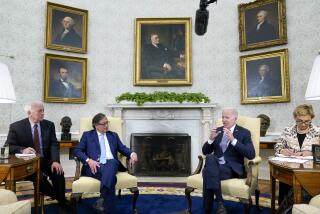Castro, Comrade From Venezuela Wave Team Flag
- Share via
HAVANA — After three days of hugs, handshakes and the shared rhetoric of revolution, Cuban President Fidel Castro and his like-minded Venezuelan counterpart, Hugo Chavez, finally got down to real business Thursday night: It was time to play ball.
Castro shed half his trademark military fatigues for a Cuban national team jacket and cap, autographed half a dozen baseballs and took his place in the third-base dugout to manage a team of Cuban veterans. And Chavez took the mound to lead his team of retired Venezuelan all-stars after his wife, Marisabel, threw out the first pitch.
The extraordinary old-timers game before 50,000 screaming fans in Havana’s Latin American Stadium was a powerful symbol of a growing friendship between the two men--who have acted almost like proud father and admiring son in appearances this week--and a bonding between the two nations that could end up haunting the United States. And it was taking place in the context of America’s favorite pastime.
“No matter who wins this game, the final result will be the same,” a beaming Castro told an audience at Havana University, where he and Chavez traded playful quips and barbs a few hours before the game, which Cuba won, 5-4, just before midnight with a succession of white-bearded relief pitchers. Wire services said Cuba fielded disguised ringers from the nation’s Pan American Games team in late innings.
“Both Venezuela and Cuba will win,” added Chavez, 45, a self-described “power pitcher” who once hoped to play professional ball in a land where the game also is revered, and who moved himself to first base with the score tied, 4-4, in the fifth inning. “Each hit that I allow will be received with great affection.”
But it was the genuine affection--and similar ideologies--between the two leaders that suggests far-reaching implications for the Americas.
While Washington has long viewed the 73-year-old Castro as the most durable and committed anti-American force of the 20th century, the mercurial Chavez has cast himself as the region’s renegade of the future.
Swept to power in elections a year ago as a populist enemy of Venezuela’s freewheeling social and political elite, Chavez has proved to be an unpredictable force who has hinted at alliances with some of the U.S. government’s worst enemies abroad.
Since taking office, the former colonel, who was jailed for two years after a failed coup attempt in 1992, has invited Iraqi President Saddam Hussein to attend the next OPEC summit in Caracas, the Venezuelan capital.
He reportedly communicates regularly with Libyan leader Moammar Kadafi and has exchanged letters with the Venezuelan-born terrorist Ilich Ramirez Sanchez, known as “Carlos the Jackal.” And he refused a personal request earlier this year by U.S. anti-drug czar Gen. Barry R. McCaffrey to permit U.S. drug-surveillance flights over Venezuela.
That from the man who controls the Western Hemisphere’s largest petroleum reserves--the leader of the nation that is America’s largest single source of oil.
Oil lies at the heart of whether the bond that Castro and Chavez have cemented in Havana’s streets, university halls and the infield this week will translate into concrete assistance to Cuba and its struggling post-Soviet economy.
More than 300 Venezuelan business representatives are accompanying Chavez on his state visit that ends today, staging a trade show that offered foreign investment in Cuba and exports ranging from Venezuelan diapers, toy balloons and aluminum siding to hypodermic needles, surgical gowns and shotgun shells.
But the booth sponsored by Petroleos de Venezuela stood out all week. For months, the energy ministers of both nations have been negotiating possible petroleum deals to help Cuba surmount its most pressing economic need: affordable oil. A barter deal with Russia that provides oil for Cuban sugar expires at the end of the year.
So far, Chavez and his Cabinet ministers have spoken only of a possible effort by Venezuela to help open a Russian-built oil refinery in the Cuban province of Cienfuegos. The 76,000-barrel-a-day plant was obsolete before it was finished in 1991, and a $200-million agreement with Mexico to open it collapsed amid financial problems five years ago.
Several officials from both countries and independent analysts in the region agreed that speculation about any major oil deal is premature. Rather, they said, the images and rhetoric of closeness were meant to carry the day.
During an impassioned 90-minute speech at Havana University on Thursday, Chavez not only praised Castro but defended his one-party state, after a barrage of pro-democracy speeches from several of the presidents and prime ministers attending the annual Ibero-American Summit that preceded Chavez’s official state visit here.
The Venezuelan leader blamed Western-style democracy for economic, moral and social crises that have abounded in Venezuela--deep-seated corruption among the political and economic elite that has impoverished his nation despite its vast resources.
He used similar arguments to defend his dissolution of Venezuela’s elected National Assembly last summer and the unsuccessful 1992 coup.
Chavez reminded the audience of faculty, students and dignitaries that one of his first trips out of Venezuela after his release from prison was to visit Castro here in Havana, where he sought and received support from the Cuban president. And he stressed several times that the visit took place “four years, 10 months and 27 days ago today.”
Later, looking at the sweating Chavez during an interview after the game, Castro said: “This wasn’t just a game. It was an act of love.”
More to Read
Go beyond the scoreboard
Get the latest on L.A.'s teams in the daily Sports Report newsletter.
You may occasionally receive promotional content from the Los Angeles Times.










